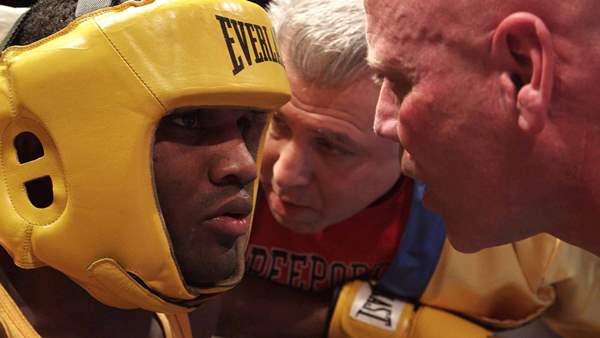This humane, straightforward documentary follows three people as they prepare for the New York Daily News’s Golden Gloves, which is the world’s oldest and largest amateur boxing competition. Well researched and subtle, the film provides a clear window into the world of amateur boxing, as well as creating a strong sense of its importance in the lives of the participants.
Cradle of Champions is especially notable for its respect toward its subjects. All the athletes are allowed to speak in their own voice. Nothing sounds scripted, no one is condescended to. As viewers, we see them as individuals and follow their journeys to the competition with interest. Nisa Rodriguez, from the South Bronx, dropped out of high school to have a child and now works as a basketball coach and goes to college, in addition to training as a boxer. All of which, she says, are intended to set a hard-working example for her young son.
Titus Williams and James Wilkins, from Long Island and Staten Island respectively, have a history of competition, and their fight is the most anticipated event of the film. Titus has already won many medals and wants to finish strong before he graduates to the professional level. James, who has struggled in school and with the suicide of a friend, hopes to finally win the Golden Gloves after many years of trying. Viewers won’t doubt the significance of boxing to either one of them for a second.
Furthermore, it is rare for the filmmakers to provide any kind of exposition or narration. Almost everything we hear about this world comes from those they interview. We also hear from coaches, family members, and other personnel intimately involved. Consequently, viewers feel as though they are getting an intimate and authentic look at this subculture.
One of the more fascinating threads involves the roles gyms and the sport have played in communities that are usually far from affluent. James, we are told repeatedly, is the kind of person who, if he isn’t boxing, is in trouble—his family and his coaches attest to this. The New York Parks Department used to have many more gyms in the city, and boxing programs were run through the Police Athletic League, until they were shut down in 2007. The former PAL director gives an impassioned defense of boxing programs and how, in his eyes, they provide a safe outlet for kids who otherwise would be attracted to gangs. It is perhaps the film’s greatest accomplishment that viewers leave with a sense of the social function of boxing.
This film is unlikely to interest anyone who is not a boxing devotee—I, for one, was not converted. Nevertheless, chances are viewers will be won over by the filmmaker’s empathy toward his subjects and the precision with which we see them rendered onscreen.







Leave A Comment